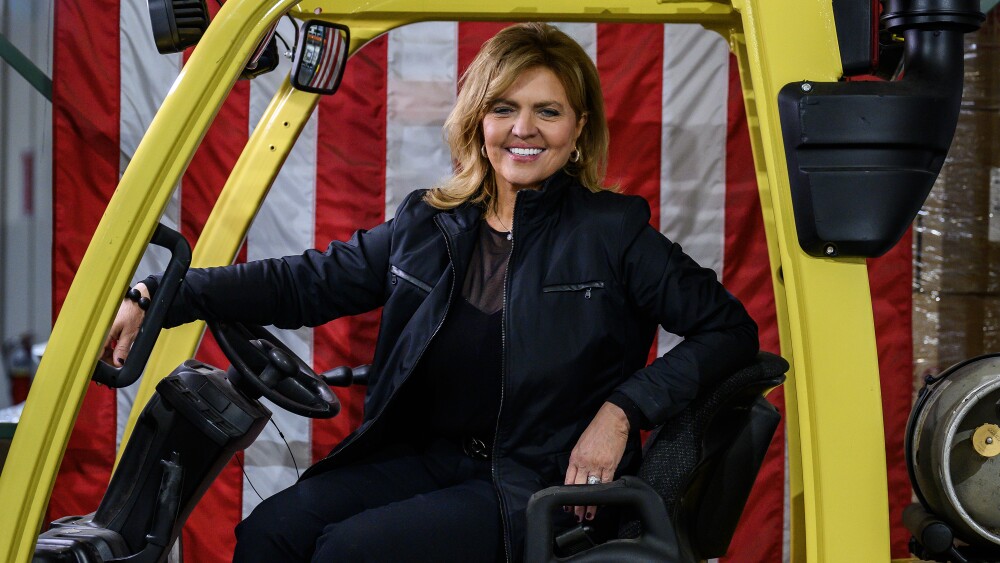The line of job applicants stretched around the building the day Heirloom Traditions Paint started hiring in Taylorsville, Kentucky. Paula Blankenship’s coveted line of ALL-IN-ONE paints transformed her into Spencer County’s largest private employer. But it almost didn’t happen. In 2016, the company faced a crisis: pivot to direct-to-consumer sales or close its doors.
Thirty miles from the nearest interstate, shipping heavy, liquid products to customers individually and nationwide was nearly impossible for Blankenship. Costly, clunky, and time-consuming, fulfillment was a chokepoint to her business growth. The stakes were high—these jobs had finally given local residents an alternative to hour-long commutes to Louisville. Now their future hung in the balance.
“We are not in a handy location,” said Blankenship. “This town is not connected to infrastructure, it’s just a two-lane road. Before we could even begin scaling, we had to convince national carriers to service our location. Getting pickup services was a constant challenge.”
The turning point came with Fulfillment by Amazon (FBA), a partnership that not only kept Heirloom Traditions’ doors open but catapulted the Kentucky business onto the national stage. FBA provided the sophisticated logistics infrastructure Blankenship’s paint company needed, handling the complex challenges of storing, picking, packing, and shipping liquid products. All she needed to do was get her product into Amazon’s network, and FBA would handle the rest.
For a small manufacturer beginning to scale, this access to Amazon’s nationwide fulfillment network meant she could keep her employees working while reaching customers across the country.
“Amazon levels the playing field. If you’re in a small community like we are, you can scale nationwide through FBA,” Blankenship explained. “When customers see Prime, they know the product is usually going to get there in one to two days. People today value their time as money. Fast shipping matters.”
The impact was immediate and substantial. Sales grew to $4 million in their first year with FBA, then reached $10 million the following year. Instead of laying off workers, they were hiring. This rapid growth enabled Blankenship to expand her product line from a handful of items to hundreds available through Amazon, while maintaining consistent nationwide availability—a feat that would have been difficult and costly to manage without FBA.
The success through FBA led to even bigger opportunities for job creation. In 2023, Blankenship purchased the 75-year-old paint manufacturer that had been making some of their products, preserving those manufacturing jobs while securing their supply chain and adding a successful line of swimming pool paints. “We put all those products in the Amazon store, and it did millions in sales in a short selling season last year,” said Blankenship.
Today, Heirloom Traditions generates $30 million in annual revenue between the businesses. Its success has enabled a $7 million investment in new manufacturing facilities and a 30,000-square-foot warehouse with an attached retail space in Taylorsville, with 53 jobs—jobs that would have disappeared without FBA’s solution to their logistics challenges. In 2021, demonstrating their commitment to the workforce that helped build the company, Blankenship converted the business to an Employee Stock Ownership Plan (ESOP), giving their workers ownership of 49% of the company.
“Our employees’ futures are tied to our success here in Taylorsville. The impact is generational. It’s not just about the product that we deliver to our customers, but it’s also about the people who make it happen—we’re all connected,” said Blankenship.
Looking ahead, Blankenship is building out her own website to include Amazon’s “Buy with Prime” experience. Buy with Prime enables Heirloom Traditions to offer the same fast, reliable shipping on their own website that Prime customers expect from Amazon, with the same payment solutions they already use. “When customers see that Buy with Prime button on our website, it gives us immediate credibility,” Blankenship said. “They know they can trust our small business because Amazon is handling the delivery. It’s going to help us scale even more.”
This next phase of growth builds on a partnership that has already redefined what’s possible for small businesses and rural manufacturing.
“I couldn’t grow my business without a partner like Amazon,” Blankenship said. “They solved the logistics challenges that were holding us back and made it possible for a rural Kentucky small business to compete nationally.”


